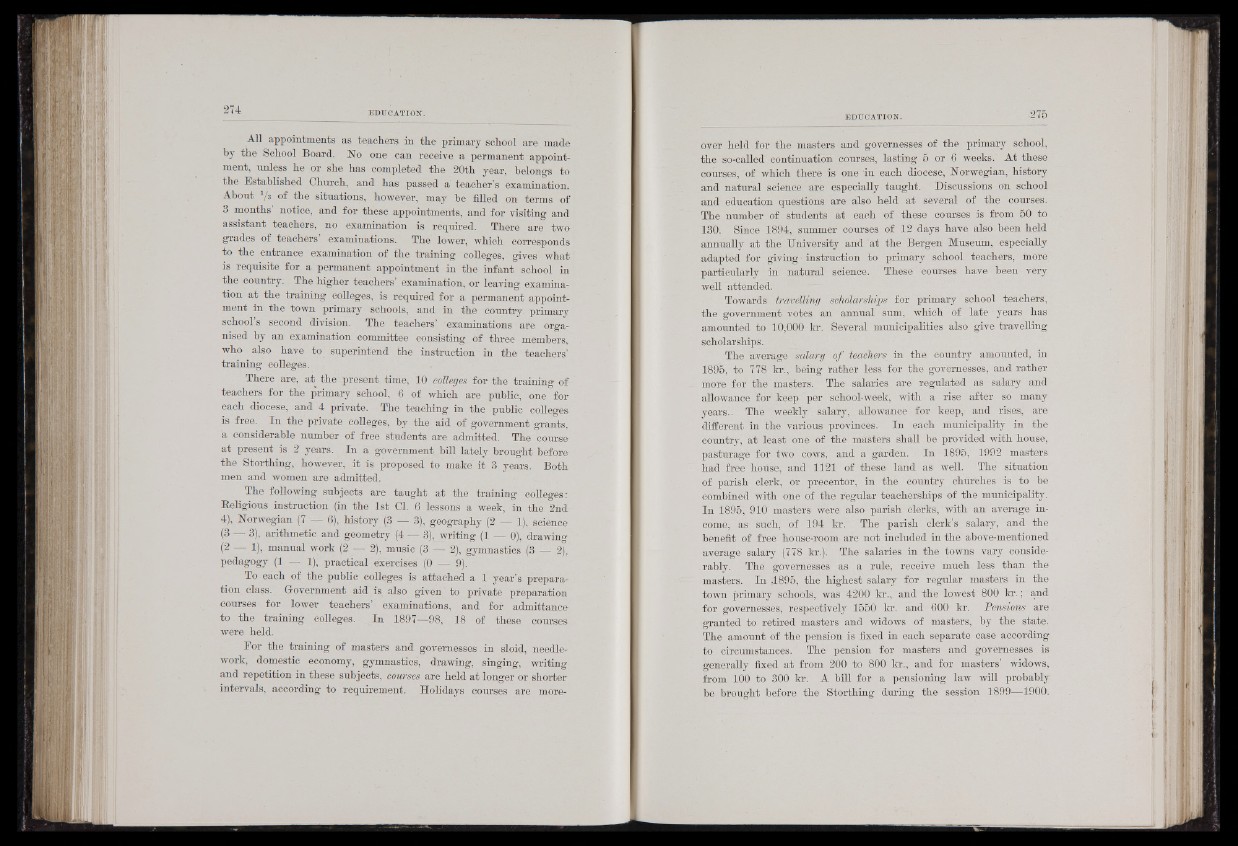
All appointments as teachers in the primary school are made
by the School Board. No one can receive a permanent appointment,
unless he or she has completed the 20th year, belongs to
the Established Church, and has passed a teacher's examination.
About Vs of the situations, however, may he filled on terms of
3 months notice, and for these appointments, and for visiting and
assistant teachers, no examination is required. There are two
grades of teachers’ examinations. The lower, which corresponds
to the entrance examination of the training colleges, gives what
is requisite for a permanent appointment in the infant school in
the country. The higher teachers’ examination, or leaving examination
at the training colleges, is required for a permanent appointment
in the town primary schools, and in the country primary
school’s second division. The teachers’ examinations are organised
by an examination committee consisting of three members,
who also have to superintend the instruction in the teachers’
training colleges.
There are, at the'present time, 10 colleges for the training of-
teachers for the primary school, 6 of which are public, one for
each diocese, and 4 private. The teaching in the public colleges
is free. In the private colleges, by the aid of government grants,
a considerable number of free students are admitted. The course
at present is 2 years. In a government bill lately brought before
the Storthing, however, it is proposed to mate it 3 years. Both
men and women are admitted.
The following subjects are taught at the training colleges:
Religious instruction (in the 1st Cl. 6 lessons a week, in the 2nd
4), Norwegian ( tHH6), history (3 — 3), geography (2 — 1), science
(3 — 3), arithmetic and geometry (4 — 3), writing (1 — 0), drawing
1 9 9 1 ) , manual work (2 — 2), music (3 ?§ 2), gymnastics ( 3 B p ) ,
pedagogy (1 — 1), practical exercises (0 — 9).
To each of the public colleges is attached a 1 year’s preparation
class. Government aid is also given to private preparation
courses for lower teachers' examinations, and for admittance
to the training colleges. In 1897—98, 18 of these courses
were held.
For the training of masters and governesses in sloid, needlework,
domestic economy, gymnastics, drawing, singing, writing
and repetition in these subjects, courses are held at longer or shorter
intervals, according to requirement. Holidays courses are moreover
held for the masters and governesses' of the primary school,
the so-called continuation courses, lasting 5 or 6 weeks. At these
courses, of which there is one in each diocese, Norwegian, history
and natural science are especially taught. Discussions on school
and education questions are also held at several of the courses.
The number of students at each of these courses is from 50 to
130. Since 1894, summer courses of 12 days have also been held
annually at the University and 'at the Bergen Museum, especially
adapted for giving instruction to primary school teachers, more
particularly in natural science. These courses have been very
well attended.
Towards trowelling scholarships for primary school teachers,
the government votes an annual sum, which of late years has
amounted to 10,000 kr. Several municipalities also give travelling
scholarships.
The average salary of teachers in the country amounted, in
1895, to 778 kr., being rather less for the governesses, and rather
more for the masters. The salaries aré regulated as salary and
allowance for keep per school-week, with a rise after so many
years.. The weekly salary, allowance for keep, and rises, are
different in the various provinces. In each municipality in the
country, at least one of the masters shall be provided with house,
pasturage for two cows, and a garden. In 1895, 1992 masters
had free house, and 1121 of these land as well. The situation
of parish clerk, or precentor, in the country churches is to be
combined with one of the regular teacherships of the municipality.
In 1895, 910 masters were also parish clerks, with an average income,
as such, of 194 kr. The parish clerk’s salary, and the
benefit of free house-room are not included in the above-mentioned
average salary (778 kr.): The salaries in the towns vary considerably.
The governesses as a rule, receive much less than the
masters. In ,1895, the highest salary for regular masters in the
town primary schools, was 4200 kr., and the lowest 800 k r.; and
for governesses, respectively 1550 kr. and 600 kr. Pensions are
granted to retired masters and widows of masters, by the state.
The amount of the pension is fixed in each separate case according
to circumstances. The pension for masters and governesses is
generally fixed at from 200 to 800 kr., and for masters’ widows,
from 100 to 300 kr. A bill for a pensioning law will probably
be brought before the Storthing during the session 1899—1900.